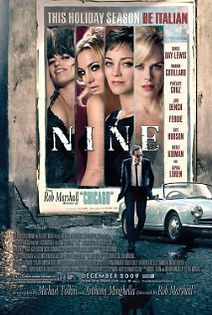|
[originally published April 5, 2010.]
Because I am a woman, I must make unusual efforts to succeed. If I fail, no one will say, "She doesn't have what it takes." They will say, "Women don't have what it takes."
Clare Boothe Luce
[*Entire article is a spoiler alert] Okeedokee (do people still say that?), here we go. I saw the film ‘Nine: “Nine is a musical with a book by Arthur Kopit and Mario Fratti, music and lyrics by Maury Yeston. The story is based on Fratti's adaptation of Federico Fellini's semi-autobiographical film 8½. It focuses on film director Guido Contini, savoring his most recent (and greatest) success but facing his fortieth birthday and a midlife crisis blocking his creative impulses and entangling him in a web of romantic difficulties in early-1960s Venice.”(Wikipedia: The Free Encyclopedia.)
The film is not a documentary.
No doubt the talent was there, the fashion was fabulous, there was glitz and glam and Sophia Loren. All the things I adore but the film was flawed – majorly. The context is the 60s when the idea of women-as-objects prevailed. The film was actually made in 2009. Films made in the 60s stand as documents of the time. Films made now can comment on the time. I feel that it is a cultural responsibility.
Film theory has been very vocal about the traditional “gaze:” “In considering the way that films are put together, many feminist film critics have pointed to the "male gaze" that predominates in classical Hollywood filmmaking… Laura Mulvey's seminal essay "Visual Pleasure and Narrative Cinema" (written in 1973 and published in 1975) expands on this conception of the passive role of women in cinema to argue that film provides visual pleasure through scopophilia, and identification with the on-screen male actor. She asserts: "In their traditional exhibitionist role women are simultaneously looked at and displayed, with their appearance coded for strong visual and erotic impact so that they can be said to connote to-be-looked-at-ness," and as a result contends that in film a woman is the ‘bearer of meaning, not maker of meaning.” (Wikipedia: The Free Encyclopedia)
I enjoy validating women’s re-appropriation of “the gaze” in a subversive kind of way. I adore power-through-sexuality. An article written in response to one of mine says, “What intrigues Shiller is the gender-bending identification that leads straight women to bond with the love lives of overtly gay male characters (some of whom are played by straight men, which adds yet another layer to the conundrum). She concedes that "hot male bodies in action are a big part of the draw," but maintains there's more to this "female gaze" than meets the eye. "Juggling the object-of-desire's ambiguous sexuality is part of the straight fan's own gender performance," she writes. "The object she desires says something about her own sexual play and sexual orientation." (San Francisco Chronicle) Subverting the traditional ‘gaze” is amazing.
I’m going to resist the strong temptation to turn this article into a film theory lesson. I can only hope that film Profs will use this movie as an exquisite example of “the gaze.” The women here were sexual and used their sexuality to ascertain power but unfortunately all of their power revolved around getting the male director. In no way did they make anything their own. I am frankly exhausted by a notion of straight man/director as centre of the universe. It is insulting to say the least.
You know, in traditional Melodrama and Opera women are punished and are usually killed for being sexual and having desire. Pretty lethal stuff, eh?
The Nicole Kidman character says that she’d rather be the man than the woman behind the man. She also laments that women come off of their pedestals for a mere kiss. But women are still beautiful objects on a pedestal in the film. If what she articulated linked up with the film’s portrayal, well heck, that would make sense but it does not link up.
I wanted the women to own power, be gorgeous, have talent and be sexual. It may be hard to do this in life but on-screen a possibility exists. So when I see recycled, harmful ideology I want to scream, or write an article.
It is incredibly powerful to rework “the gaze” in female terms and I wanted to re-read this film but I could not. I felt pulled in two directions. The aesthetic was great but the representation of women sucked.
Bibliography
Chonin, Neva. “Young Gay Men Having Sex.” San Francisco Chronical. September 12, 2004.
Nine. Dir. Rob Marshall. The Weinstein Company. 2009.
Shiller , Romy. “Why is Queer As Folk Making Women … ?”
http://www.fabmagazine.com/features/womenwet/index.html
The Quote Garden
http://www.quotegarden.com/index.html
Wikipedia: The Free Encyclopedia
http://en.wikipedia.org/wiki/Feminist_film_theory
Wikipedia: The Free Encyclopedia
http://en.wikipedia.org/wiki/Nine_%28musical%2
|



